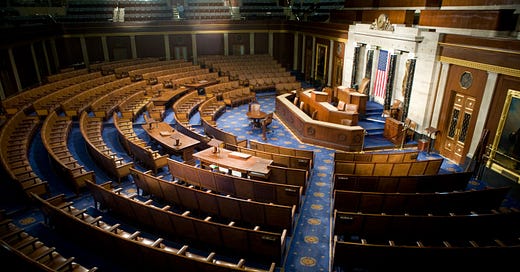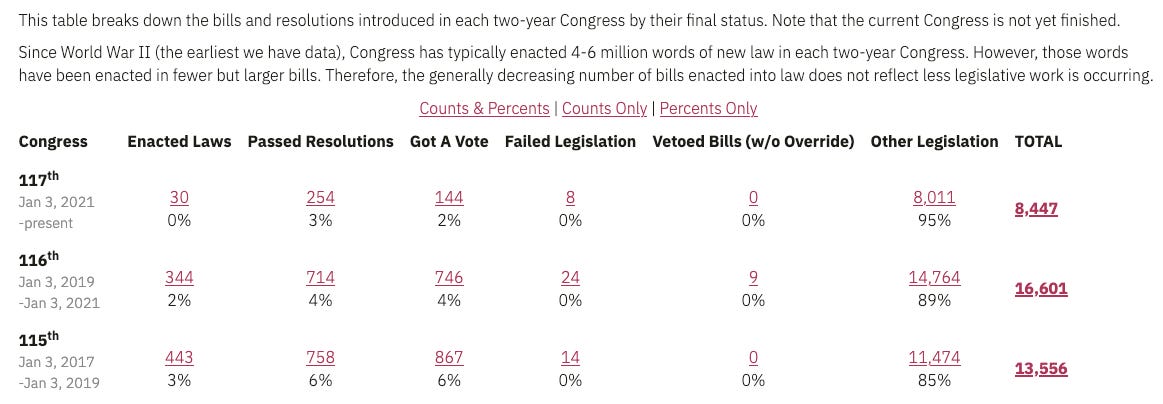Publisher’s Riff
As more than 15 million Americans who rent in nearly 7 million households face the threat of accelerated eviction upon the expiration of a needed federal eviction moratorium, and as about $44 billion in already appropriated federal rental assistance to fix that problem is still floating around untouched, Congress goes on summer break. The House of Representatives went through a round of last votes as of Friday, July 30th and then quickly packed it up to go on break with the Senate expected to adjourn its legislative business next week on Friday, August 6th.
It’s a constant and very troubling fixture in the way the legislative branch of United States government operates: constant breaks or “recess” amid multiple crises and devastating threats that require emergency response and swift policymaking. Yet, Congress, in its infinite wisdom, deems long, multi-week “recesses” necessary - and gets federal holidays off on top of that, too. Here’s a solid overview look of the 2021 House and Senate calendar from a top D.C.-based lobbying firm (because if anyone knows when these folks are in their offices or not, it’s the special interest lobbyists who hassle, haggle and hustle them) …
If you’re an average citizen who realizes they have a “recess” and cry foul, they’ll indignantly claim that recess just means there’s no floor sessions or votes, but they’re still doing lots of work, offices are open. House Members call it the busy-sounding “district work” and Senators call it “state work.” But, anyone who’s been either a longtime observer of American politics or has worked in these spaces can confidently call bullshit. There may be minimal constituent-interface and community work, but most of it is fundraising to replenish political war chests in preparation for the next cycle and, in many instances, Congressional delegation trips overseas.
More on that from Axios.com …
Democrats have scheduled destination fundraisers — a mix of sun, fun and lobbying — on July weekends and throughout the August recess this summer, lobbyists who have been invited to the events tell Axios.
The fundraising is set to take members out of Washington even as both chambers face difficult negotiations over the bipartisan infrastructure bill and any potential budget resolution. Both demands have the potential to affect their usual monthlong recess.
Destination fundraisers give lawmakers from both parties an incentive to find common ground and confine their disagreements to the workweek or postpone them until everyone returns to Washington in the fall.
The House's last votes are scheduled for July 30, with the Senate planning to leave town after the first week of August.
Republicans have their own events planned, and there are potentially many more events scheduled for both parties. Democrats largely stopped hosting big-group fundraisers outside of Washington during the pandemic, leaving the field to Republicans.
So, now, Democrats are playing catch-up.
Recess, especially the current long summer one Congress just embarked on now, is just a glorified term for the kind of extra vacation package a very small, priviliged and elite segment of the American population enjoys compared to everyone else. Give thanks to Congress passing what was called the Legislative Restoration Act in 1970, which demanded more work-life balance and a generous 5-week summer break for Members after concerns the demands of legislating were exhausting.
There might be an argument for that, no one wants burned out lawmakers. And, maybe that argument holds weight if Congress were actually getting work done - clearly it’s not, see GovTrack …
The other argument for keeping the prolonged summer recess and other assorted breaks is that it gives legislators more time to connect with constituents. But, if that’s working then we wouldn’t have a situation where nearly 65 percent of Americans don’t know who their Representatives are, according to a 2017 survey from Haven Insights …
The public will need to re-evaluate the wisdom of long summer breaks for policymakers, especially in times of crisis and broken governance. Plus, we’re in the 21st century. Governance can, easily, be a lot more efficient and seamless and ongoing (it seems like we demand that for every other function in society except for the most important one that holds it all together: government). Legislators now enjoy a level of staffing resources, technology and endless communication channels that allow them to maintain a constant flow of effective “district work” without disconnecting themselves from crucial business in Washington. In addition, now is a perfect time to further explore secure “proxy” or remote voting, something that’s been exercised by some Members for health reasons and was used frequently during pandemic. Bottom line: policymakers in Washington are taking way too much time off while important national business suffers and more Americans must deal with the consequences of nothing much getting done.






